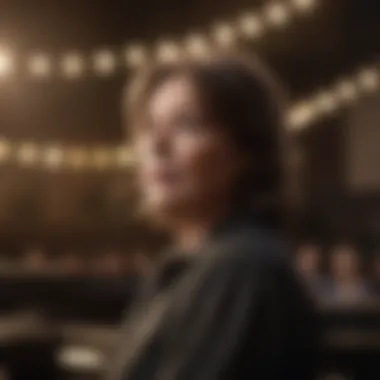The Musical Journey of Diane Hall: A Comprehensive Analysis


Intro
Diane Hall's journey through the music industry is a fascinating exploration of talent, diversity, and influence. Her music transcends genres, making her a remarkable figure in contemporary artistry. This analysis looks into her life, delving into both the personal and artistic dimensions that shaped her career.
As we dissect her work, we will uncover how her biography, influences, and stylistic evolutions narrate a compelling story. We will also examine her significant works and the impact they have had on culture and society today.
Artist Profile
Biography and Background
Diane Hall was born in a small town that shaped the early years of her music career. She discovered her love for music at an early age. Growing up in an environment rich with various musical styles, she found inspirations in both local and global sounds.
With her family encouraging her endeavors, Diane began to hone her craft. Over the years, she would move to larger musical hubs, connecting with established musicians and beginning to create her unique sound. Her biography is a testament to perseverance and dedication, reflecting her relentless pursuit of artistic excellence.
Major Influences and Inspirations
Various influences have played a pivotal role in shaping Diane’s artistic journey.
- Genre Diversity: She draws inspiration from pop, jazz, and indie rock. Each genre added a different layer to her musical identity.
- Iconic Artists: Figures like Joni Mitchell and Prince significantly influenced her songwriting style, vocals, and stage presence. Their work encouraged her to think outside the traditional boundaries of music.
- Cultural Experiences: Travel has broadened her musical perspective, exposing her to new sounds and traditions.
Diane incorporates these influences into her music, creating a distinctive blend that resonates with a wide audience.
Song Analysis
Theme and Lyrics Breakdown
Diane’s songwriting often addresses complex themes such as love, identity, and social issues. For instance, songs like "Reflections of Tomorrow" showcase a deep lyrical introspection. The themes resonate on multiple levels, engaging both casual listeners and those looking for deeper meanings.
- Emotional Depth: Her lyrics explore a spectrum of emotions, making them relatable and poignant.
- Storytelling Quality: Each song often tells a story, connecting personal experiences with universal themes.
Instrumentation and Composition
Instrumentation in Diane’s music is thoughtfully arranged. Collaborating with skilled musicians, she marries various instruments to complement her vocals.
- Guitar and Piano: These are often the backbone of her songs, providing both melody and harmony.
- Electronic Elements: In recent works, she has started to incorporate electronic beats, expanding her sonic landscape.
- Orchestral Arrangements: Some tracks include strings and woodwinds, introducing richness and depth.
Her compositions are well-structured, with a clear understanding of rhythm and melody, enabling her to innovate while staying true to her roots.
Ending
Diane Hall's musical journey is fascinating and complex. The analysis of her career shows a talented artist whose work reflects her diverse influences, personal experiences, and artistic evolution. As her story unfolds, it becomes clear that Diane Hall is poised for continuing relevance in the evolving landscape of the music industry.
Early Life and Background
Understanding the early life and background of Diane Hall provides essential context to her artistic journey. The formative years of a musician often influence their later work, shaping their style, preferences, and overall approach to music. In the case of Hall, her upbringing plays a crucial role in unveiling the layers of her musical identity. It highlights how personal experiences, cultural landscapes, and family dynamics contribute to a musician's narrative and inform their creative outputs.
Family Influence on Musical Interests
Diane Hall was born into a family where music was not merely a pastime but a significant part of everyday life. Her parents nurtured a deep appreciation for various musical genres, exposing her to both classical music and contemporary sounds from an early age. This environment allowed Hall to cultivate her interests, encouraging her to explore different instruments and vocal styles.
The supportive atmosphere provided by her family meant that Hall was not only able to listen to music but also actively engage in it. Weekly family gatherings often featured impromptu performances; her relatives encouraged her early experiments with singing and songwriting. These experiences solidified her passion for music. The clear message from her family was that creativity was a valued pursuit. This familial encouragement instilled confidence in her, allowing for the fearless exploration of her musical abilities.
Initial Exposure to Music
Diane's initial exposure to music extended beyond the walls of her home. Local jazz clubs and community events in her neighborhood created opportunities for her to witness live performances. These events were pivotal, as they showcased the raw energy and authentic expression that live music provides. Here, she learned to appreciate the nuances of performance—how a musician connects with their audience and the emotions that music can evoke.
Hall’s formal education began with piano lessons, which introduced her to music theory and composition. This foundational training gave her the tools to articulate her ideas and emotions through music. Additionally, exposure to diverse genres laid the groundwork for her eclectic style, blending elements from jazz, folk, and pop. Thus, the combination of familial support and practical experiences shaped Diane Hall’s musical beginnings, fostering a unique perspective that she would carry throughout her career.
"Every note played, every song sung during those years, remained etched into my soul, guiding my journey as an artist."
— Diane Hall
In summary, Diane Hall's early background encapsulates how family dynamics and early experiences establish a framework for her music career. Those formative years were critical, equipping her with inspiration and foundational skills necessary to navigate the complexities of the music industry later in life.
Education and Musical Training


The value of education and musical training in shaping Diane Hall’s career cannot be overstated. A formal educational background provides the foundational knowledge and technical skills necessary for any musician. It equips them with the ability to understand music theory, composition, and performance techniques. For Diane, embracing these elements laid the groundwork for her future as a versatile artist, allowing her to explore a myriad of genres with confidence and sophistication. With a commitment to learning, Hall represents the ideal of a musician who understands the historical context of her art while innovating within it.
Formal Education in Music
Diane Hall’s formal education in music began at a young age. She attended a prestigious music school where she received rigorous training in both performance and theory. This experience gave her exposure to a wide range of musical styles and traditions. During this time, she honed her skills in vocal technique, instrumental proficiency, and music composition. Such a comprehensive curriculum helped her develop a unique sound early on in her career.
Formal education allowed Diane to engage with both her instructors and fellow students. This networking provided invaluable opportunities for collaboration that further enriched her artistic perspective. Many emerging artists find that establishing relationships within their educational settings can lead to fruitful partnerships later in their careers. In Diane's case, this was significant as she began to explore varied artistic avenues.
Influential Mentors
No musician's journey is complete without the guidance of influential mentors. For Diane Hall, several key figures played crucial roles in her development. These mentors, often seasoned artists themselves, provided not just technical instruction but also insights into the nuances of the music industry. The knowledge they imparted included advice on navigating production challenges, marketing oneself, and understanding audience dynamics.
Mentorship can take many forms, and for Diane, the feedback she received shaped her approach to writing and performing music. She absorbed lessons about emotional expression, stage presence, and artistic integrity from mentors who truly believed in her talent. This support system was essential in helping her understand that music is not just about technical precision, but also about storytelling and connection with listeners.
"Having mentors who believed in me transformed my approach to music."
—Diane Hall
The culmination of formal training and mentorship provided Diane Hall with a solid platform to launch her career. As she transitioned into professional music, the lessons learned would prove invaluable in her artistic evolution. Her education did not just equip her with skills; it also instilled a deep appreciation for the art form that continues to resonate in her work.
Career Beginnings
Understanding the career beginnings of Diane Hall is crucial to grasping her impact on the music industry. This phase of her journey highlights the initial challenges she faced and the pivotal decisions she made that shaped her future. Early experiences often set the tone for an artist’s style and public persona. Thus, examining this foundation allows us insights into Hall’s artistic identity.
First Recording Contracts
Diane Hall’s entry into the music scene marked a significant turning point in her life. Her first recording contracts with noteworthy labels, such as Atlantic Records, provided her the platforms to showcase her talent. These contracts not only offered her financial backing but also exposed her to industry professionals who helped hone her craft.
The pressure to conform to market demands can be daunting for any new artist. However, Hall managed to maintain her artistic vision. She entered the studio with a unique sound that blended elements from different genres, setting her apart.
These early contractual arrangements were not without challenges. The negotiation of terms taught Hall valuable lessons about the business aspect of music. Ensuring creative control became a priority for her. The experience gained during these formative years influenced her later decisions regarding future projects.
Early Performances and Reception
Live performances played a crucial role in launching Diane Hall’s career. Her debut show at The Bitter End in Greenwich Village was an early testament to her stage presence. The performance captivated audience with its raw energy and heartfelt lyrical delivery.
Reactions from both audiences and critics were mixed but largely encouraging. While some reviews highlighted her distinct voice and potential, others pointed to areas needing refinement. Constructive criticism was important to Hall; it propelled her to evolve her performance style.
Early performances also offered her opportunities for collaboration. Meeting musicians who shared her vision enriched her exposure to different styles, laying groundwork for fruitful partnerships in the future. These initial public forays not only rallied her early fan base but also caught the attention of influential figures in the music industry.
Through solidifying her presence at these events, Diane Hall began to turn heads, establishing a reputation that would support her future endeavors. Her journey from small venues to larger stages can be traced back to these early days where determination and talent intertwined.
Notable Albums and Tracks
In discussing Diane Hall’s musical trajectory, examining her notable albums and tracks becomes essential. These works serve as milestones that reflect her evolution as an artist and her impact on the broader music landscape. They encapsulate not only her artistic vision but also the responses and interpretations from listeners and critics alike, illustrating the resonance of her music across various demographics.
Analysis of Debut Album
Diane Hall's debut album marked a significant turning point in her career. Released during a time when the music scene was undergoing substantial changes, the album presented a fresh perspective. Hall combined traditional elements with contemporary sounds, showcasing her unique approach. The title track effectively set the tone for the entire album, engaging listeners with its poignant lyrics and compelling arrangement.
Key Elements of the Debut Album:
- Lyrical Depth: The songs explore complex themes, presenting narratives that connect with audience emotionally.
- Innovative Sound: The production techniques introduced new textures in her genre.
- Cohesion: Each track harmonizes with others, creating a seamless listening experience.
Overall, the debut album served as a foundation for her future works and established her as a formidable presence in the industry.
Critical Reception of Subsequent Works
Following her debut, Diane Hall continued to release albums that drew critical attention. Each of these works was met with varying degrees of acclaim and criticism, reflecting the evolution of her sound and artistic expression. Her sophomore project exhibited a maturation of style, incorporating more complex arrangements and broader influences.
"Each subsequent album seems to dismantle the previous one, showcasing Hall's relentless pursuit of artistic authenticity."
Notable Aspects of Critical Reception:
- Diverse Reviews: Critics offered diverse analyses, some praising her innovative collaborations, while others noted the risks taken in her experimentation.
- Industry Impact: Many highlighted Hall's ability to influence emerging artists, establishing new norms in the music scene.
- Commercial Success: Several albums achieved commercial success, further solidifying her place in the industry.
The progression of Hall’s works illustrates her resilience and dedication as an artist. Each release not only reflects her artistic intent but also marks her enduring influence on contemporary music.


Artistic Evolution
Understanding the concept of artistic evolution is essential in examining Diane Hall's extensive career in music. This evolution reflects her unique ability to adapt to changing musical landscapes while maintaining a distinct artistic identity. Hall's path in the music industry illustrates a journey of constant growth, experimentation, and reinvention. It showcases not only her personal development as an artist but also her impact on the broader musical environment, encouraging others to explore diverse styles and approaches.
The significance of artistic evolution lies in how it encapsulates the fluidity of Hall’s musical expression. Each phase of her career reveals a shift in her musical style, influenced by social, cultural, and technological changes. This element serves multiple purposes: it enhances her relevance, challenges genre boundaries, and fosters connections with various audiences. The ability to evolve while staying true to one's core beliefs solidifies an artist's legacy and resonates with listeners who appreciate authenticity.
Moreover, such evolution involves numerous considerations. Hall's willingness to experiment with different genres—notably pop, jazz, and folk—provides an excellent illustration of how artistic evolution can broaden an artist's appeal. As she ventured into collaborations with various musicians, her diversifying influences became integral to her growth. This continuous transformation supports a narrative that highlights the dynamic and ever-present nature of the music industry, reflecting the reality that growth is paramount for longevity.
Through artistic evolution, Diane Hall teaches aspiring musicians the importance of embracing change. This approach not only enhances creativity but also ensures relevance in a fluctuating industry.
Musical Style Developments
Diane Hall’s musical style developments represent a crucial aspect of her artistic evolution. They highlight her transition from a more traditional sound to incorporating contemporary influences, which has kept her work fresh and relevant. Her debut album introduced a sound that echoed classic influences, but soon after, she began experimenting with elements such as electronic arrangements and world music influences.
Some key developments include:
- Integration of Genres: Hall fuses elements across genres, creating a unique sound that sets her apart.
- Lyrical Maturity: Over the years, her lyrics have evolved, reflecting deeper emotional and philosophical themes.
- Vocal Techniques: She has refined her vocal delivery, showcasing a broader range and technique that resonates with her audience.
Collaborative Projects
Collaborative projects have played an integral role in Diane Hall's career, showcasing her ability to work with diverse artists and further her artistic exploration. Collaborations such as those with renowned artists have not only enriched her musical palette but have also opened doors to new audiences.
Some notable partnerships include:
- Her work with The Jazz Collective, where she blended traditional jazz with modern elements,adding depth to her discography.
- Collaborations with Indie Folk singers, which allowed her to experiment with simpler melodies and more organic sounds.
- Producers like Mark Ronson, who helped her explore a more commercial sound, reaching mainstream audiences.
"Collaboration is a powerful tool; it pushes boundaries and fosters innovation within the music circuit."
These projects enabled Hall to achieve a dynamic range of musical expressions. They have showcased her adaptability and contributed significantly to her continuous growth as an artist.
Influence on Popular Culture
The examination of Diane Hall's influence on popular culture is crucial for understanding her role within the music industry. Hall's music encapsulates various genres, pushing boundaries and challenging conventions. Her style and thematic elements have significantly impacted not only her contemporaries but also the next generation of musicians seeking inspiration in their journeys.
Impact on Emerging Artists
Diane Hall's influence extends prominently to emerging artists across diverse musical landscapes. Many young musicians regard her as a touchstone for authenticity and innovation. By embracing different styles and blending them seamlessly, she paves a way for new artists to experiment and develop their unique expressions. Her vocal techniques and songwriting prowess serve as a guide for those listening for hints of originality and depth. The following key points highlight her influence:
- Role Model: Artists such as Billie Eilish and Hozier cite Hall as a major influence in their artistic development. They admire her ability to convey complex emotions through simple yet evocative lyrics.
- Diversity in Sound: Hall's willingness to fuse genres allows emerging artists to feel free to explore sounds outside traditional norms, thus expanding the realms of popular music.
- Cultural Commentary: Emerging artists echo her focus on relevant social issues, often using their platforms to address matters such as identity, mental health, and societal expectations.
Media Representations
The media’s portrayal of Diane Hall is an essential component of understanding her impact on popular culture. Hall has been a subject of numerous articles, interviews, and documentaries that dissect her music and persona. These representations often emphasize her artistic versatility and commitment to social movements.
Moreover, she has been featured prominently in publications such as Rolling Stone and NME, which has enhanced her visibility and solidified her status as an influential figure in music. Media representations have facilitated deeper conversations about:
- Artistic Integrity: Many reports focus on Hall’s uncompromising vision, highlighting her independence from industry pressures and her insistence on authenticity in her work.
- Public Perception: Through various interviews, Hall expresses how she navigates audience expectations versus her artistic vision. This dynamic interests many listeners who are keen to understand the complexities of a successful music career.
- Cultural Impact: Television shows featuring her music often spotlight the cultural relevance of her lyrics, fostering discussions on their societal implications, hence influencing public discourse.
Awards and Recognitions
In the landscape of music, awards and recognitions serve as significant markers of an artist's impact and contribution to the industry. For Diane Hall, accolades highlight not just her achievements, but also signify her influence within various music genres. They create a narrative around her career that showcases her artistry and validates her unique position in a highly competitive field. Accomplishments in this area can inspire emerging artists and reinforce the cultural relevance of music as an art form.
Major Music Awards
Diane Hall's journey is punctuated by numerous major music awards that acknowledge her talent and dedication. These awards often include prestigious honors such as Grammy Awards, American Music Awards, and Billboard Music Awards. Each of these accolades not only recognizes her individual achievements but also serves to elevate her platform within the industry.
The significance of such awards goes beyond the physical trophy; they represent public recognition and celebrate the hard work that has gone into mastering her craft. For Hall, winning a Grammy Award can have lasting implications for her career, making her music more visible and influencing potential listeners and collaborators.
- Grammy Awards: Recognized as one of the highest achievements in the industry. Diane Hall has won several Grammy Awards, solidifying her status as a leading figure in music.
- American Music Awards: These awards, based on the votes of the public, showcase genuine fan appreciation, which is vital for an artist's reputation. Diane Hall’s wins here reflect her resonance with audiences.
- Billboard Music Awards: Celebrating chart performance, these awards emphasize Diane Hall's commercial success and impact on the music scene.
Hall's list of award nominations and victories is continually growing, contributing to her legacy and understanding of contemporary music trends. Her work has inspired recognition not only among fans but also within the industry, yielding collaborations with other esteemed artists both recognized and upcoming.
Cultural Honors
Beyond the traditional music awards, Diane Hall has received numerous cultural honors that further affirm her influence on society. These recognitions acknowledge not only her contributions to music but also her role in promoting cultural dialogue and social change.


Cultural honors can take many forms, including recognitions from cultural institutions, honorary degrees from universities, or special acknowledgments in various media platforms. These recognitions highlight Hall’s importance not just as an artist, but as a cultural icon.
For instance, receiving honorary titles from various music academies indicates a recognition of her artistry from educational institutions, affirming her role as a mentor and figurehead in the industry.
Moreover, her involvement in initiatives addressing social issues has garnered her accolades that reflect her commitment to using music as a platform for advocacy.
"Awards are not the end; they are a reflection of a journey that inspires many. For every recognition Diane Hall receives, there is a story of dedication behind it."
Highlights of some notable cultural honors could include:
- Honorary degrees from universities recognizing her contributions to art and culture.
- Participation in global peace initiatives, showing that her influence extends beyond just music to societal wellbeing.
- Recognitions by cultural institutions, which place her work in the context of broader cultural contributions.
Personal Life and Public Persona
The examination of Diane Hall's personal life and public persona is crucial in understanding how her private experiences inform her artistic expressions. A musician's background often echoes in their work, and in Hall's case, her personal narrative is a distinctive feature of her artistry. Hall's choices, relationships, and lifestyle contribute significantly to how she is perceived by the public and how she influences her audience.
Media Perception of Diane Hall
Media perception plays a vital role in shaping how artists are viewed. In the case of Diane Hall, she has been subjected to various portrayals by the press. Often, the narratives constructed around her relationship with the music industry, her opinions on various social issues, and her lifestyle choices take center stage. The media's fascination with her personal life can overshadow her musical accomplishments, which demonstrates the delicate balance artists must maintain.
Critically, the media’s lens often emphasizes Hall's authenticity. Many journalists laud her for her transparency and willingness to discuss her struggles and triumphs. This connection has allowed fans to relate to her on a deeper level, enhancing her influence.
However, it also exposes her to scrutiny that can misinterpret her intentions or art. Negative portrayals can skew public perception, framing her as a controversial figure instead of an artist devoted to her craft. The press can thus greatly impact her commercial success and critical reception.
Philosophy and Artistic Vision
Diane Hall’s philosophy and artistic vision are at the core of her musical identity. Throughout her career, she has championed themes of emotional honesty and introspection. This resonates deeply in her songwriting, where lyricism often delves into personal experiences.
Hall emphasizes the importance of staying true to oneself, both in life and artistry. She believes that genuine self-expression is critical for an artist. By adhering to this principle, she fosters a loyal fanbase who appreciates her work’s depth. Furthermore, her artistic vision transcends mere entertainment; it involves commentary on cultural and societal issues, making her music a vehicle for advocacy.
Her body of work reflects a consistent commitment to innovation while celebrating musical traditions. Hall's artistic choices reveal her desire to connect with listeners, not only commercially but also emotionally. This philosophy powers her creative pursuits and underlines her long-lasting impact in the industry, ensuring that her contributions are recognized across generational lines.
"True artistry lies in the courage to be vulnerable, to share one's truth with the world."
In summary, Diane Hall’s personal life and public persona are multifaceted and pivotal to her narrative. The interplay between media perception and her artistic philosophy not only shapes her identity but also leaves an indelible mark on the music landscape.
Diane Hall’s Impact on Music Genres
Diane Hall's influence on music genres is profound and undeniable. This section delves into her contributions and the intricate ways she has shaped modern music. Hall's ability to integrate various musical styles showcases her versatility and creativity. Her innovative approach has not only added layers to existing genres but has also paved the way for new subgenres to emerge. This impact is especially relevant in a time when genre boundaries are becoming increasingly fluid.
Contributions to Specific Genres
Diane Hall has made significant contributions to multiple genres, including pop, folk, and rock. Each genre has its own conventions, yet Hall has skillfully navigated these, often reinventing the expectations within each. For example:
- Pop: Hall's work has bridged pop with more traditional forms, leading to hits that resonate across various audiences. She is known for her catchy melodies and thoughtful lyrics, which often challenge the superficial nature of typical pop music.
- Folk: Her folk music draws heavily from both personal experience and broader sociocultural themes. Hall's storytelling ability is particularly strong in this genre, connecting deeply with listeners on an emotional level.
- Rock: In rock, she has introduced influences from electronic and alternative styles, resulting in innovative soundscapes that redefine the genre.
Hall's fearless experimentation signifies her desire to push creative boundaries. Through her work, music enthusiasts can observe a fascinating transition within each genre.
Influence on Genre Cross-Pollination
Diane Hall's influence stretches beyond mere contributions to specific genres. It is evident in the way her music facilitates genre cross-pollination. Hall's collaborations with artists across different genres exemplify this. She has worked with musicians from jazz, hip-hop, and even classical backgrounds, enabling an exchange of ideas and styles. This has resulted in:
- New Sounds: By drawing on diverse influences, her work often features elements that challenge genre classifications. This blending has encouraged aspiring musicians to explore and experiment.
- Broader Audience: The genre-blurring nature of her music appeals to a wider audience, inviting listeners who might not typically engage with a specific genre.
- Creative Collaborations: Collaborations with artists like the singer-songwriter James Blake showcase the seamless transitions between different musical styles, expanding the reach and experimentation of both artists.
"Diane Hall represents a significant turning point in contemporary music, illustrating the potential richness found in the space between genres."
In summary, Diane Hall's impact on music genres is multifaceted. Her contributions have driven innovation and encouraged the fusion of musical styles. This set a precedent that resonates with current and future artists, reaffirming the fluidity and interconnectedness of today’s musical landscape.
Future Directions
The examination of future directions in Diane Hall's career holds significant relevance in understanding not only her trajectory but also the evolving landscape of contemporary music. This section explores potential projects and trends that may influence her artistry and the wider industry. Acknowledging future directions allows fans and scholars alike to appreciate how Hall continues to innovate and adapt to changing musical environments.
Anticipated Projects
Diane Hall has hinted at various upcoming projects, which promise to reveal new dimensions of her artistry. Collaborations with emerging artists in different genres could lead to fresh sounds. Her ability to fuse diverse musical elements has always set her apart. Therefore, potential collaborations with names like Billie Eilish or Hozier could yield intriguing results, blending Hall's established style with contemporary influences.
Additionally, her exploration into multimedia projects is noteworthy. Speculation surrounds a potential documentary detailing her creative process, which could provide deeper insight into her artistic vision. There are whispers of new music that challenges traditional concepts, perhaps integrating technology in ways not previously seen in her work.
Emerging Trends in Music
The music industry continually evolves, influenced by technology, cultural shifts, and audience preferences. Currently, trends such as genre-blending and the increasing role of social media in music promotion are prominent.
- Genre Blending: The lines between genres continue to blur. Artists now often incorporate elements of various styles, allowing for innovative sounds. This trend aligns with Hall's history of defying genre categorization.
- Social Media: Platforms like TikTok and Instagram play an essential role in how music is discovered and consumed. Hall's engagement on these platforms may not only rise but also reflect her adaptability to changing consumer behavior.
- AI and Music Creation: Technological advances in AI are reshaping music production. The incorporation of AI tools for songwriting or producing could be an area Hall may explore.







